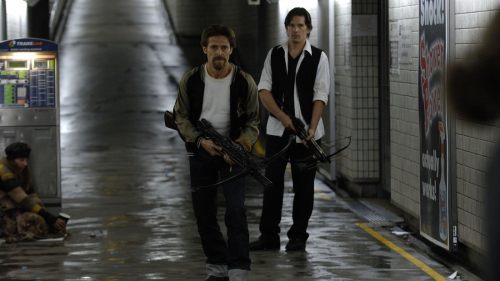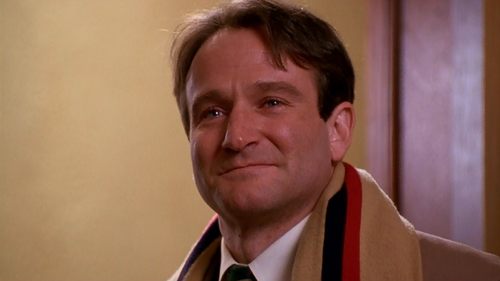SXSW Review: ADOPT A HIGHWAY Is A Journey Of Heartfelt Redemption
In 1994, California voters enacted the “Three Strikes and You’re Out” law. The essence of the law was to “require a defendant convicted of any new felony, having suffered one prior conviction of a serious felony to be sentenced to state prison for twice the term otherwise provided for the crime. If the defendant was convicted of any felony with two or more prior strikes, the law mandated a state prison term of at least twenty-five years to life.” Twenty-eight states currently have some form of a “three-strikes” law. Initially enacted as a part of the United States’ Justice Department’s Anti-Violence Strategy, many don’t realize the detrimental effects on individuals released from the system in today’s technological age. Actor Logan Marshall-Green (Upgrade) makes his directorial debut with Adopt A Highway, a story that provides an illuminating perspective on non-violent offenders who were kept in the shadows of a flawed legal system and how newfound freedom can strengthen one’s morality.
Ethan Hawke stars as Russell Millings, a man now in his 40s who was incarcerated for two decades after being convicted of possession of narcotics with intent to distribute an ounce of marijuana. In the opening scene of the film, we join Russell on his discharge date. His recovered possessions include some old clothes, a dated wrist watch, and a shoestring he wears around his neck with a couple of keys dangling loosely against his chest. Quiet and reserved, he hangs his head low and is both compliant and respectful with every step he takes on his way to freedom. Hawke’s body language throughout the film is somewhat of a marvel. He initiates an emotional response even with the most subtle physical gestures. Composer Jason Isbell compliments Russell’s reserved disposition and exacerbates situations of discomfort with distressing yet gripping melodies that aptly capture the trauma and uncertainty many felons feel once on their own in the real world.
Upon release, Russell lands a job as a dishwasher at a local fast-food restaurant. Prison has not hardened his heart, nor has it soured his soul; he’s a hard-worker and thankful for every opportunity possible. While working the late-night shift, he discovers a baby girl abandoned in a dumpster. Laying in a torn sports bag, he notices a napkin next to hear that simply reads, “Her name was Ella.” He brings her back to his motel room and attempts to care for her by feeding her condiments and Half-and-Half from the fast food restaurant in lieu of baby formula. The scenes of his interactions with Ella mostly equate to character building rather than serving as the primary plot of the film. The complexities of how to care for her are both comical and endearing. The police eventually intervene, and despite Russell’s failed attempt to adopt her, he must move on with his life. It’s a moment that, again, obscures the law. If someone left a baby to die in a dumpster and a kind-hearted man took her in, is that really so bad? In a way, both Ella and Russell’s lives almost ended entirely before they ever truly began. As a result, there’s this optimistic tone that blankets the film, void of concern that Russell would ever hurt Ella or violently snap. I don’t want to give too much of the plot away because like life itself, the voyage is unknown and a drastic turn of events can occur at any time. With that in mind, the narrative works really well despite areas where it meanders or lingers.
Jason Blum was in attendance at the SXSW screening and stated that in a way, Adopt A Highway is actually kind of a horror film, just not in the traditional sense. As one of the film’s producers, Blumhouse’s involvement allows audiences to realize that horror can appear in everyday life, but there’s also a lot of beauty and kindness that can be concealed within tragic circumstances. The manner in which the legal system does not provide proper education and career skills allowing convicts to be successful outside of prison walls leads to high recidivism rates. There’s also a large amount of lives that have been damaged due to the Three-strikes law, let alone the number of individuals who have been convicted of life sentences for possession of marijuana (which is now more loosely regulated). Adopt A Highway aims to rethink our legal system and confront that yes, there are individuals who’ve missed out on the tech boom and don’t have an email address, don’t know how to log in to a computer, and don’t know how to decipher the seemingly endless supply of product line extensions in a grocery store. In this sense, Green presents a story that encompasses both loss and gain with an emphasis on choice. The road Russell must travel to start over his life is one of pain and anxiety; and yet he chooses to live a life of gratitude. There’s an admirable acceptance and subtle positivity Russell possesses that equips him to be content with losing his job, sitting next to an overly extroverted woman on the bus, and even laying down next to his parents’ grave after discovering the death of his father the very first time he logged onto the internet. In a world of unknowns and journeying to try and rebuild his life alone, it’s almost saintly how he can keep himself together. For that reason, the storyline can be somewhat problematic. There aren’t a lot of obstacles that tempt Russell, and the road to redemption is fairly smooth given the severity of its subject matter.
There’s a certain scene that really captures the essence of Green’s directorial debut. Russell is sitting on the bed with Ella reading one of the Harry Potter books he treasured while incarcerated. He tells her, “we all have light and dark in us, but it’s what we choose to act on that really matters.” This statement is emblematic of the film’s soul, and Hawke personifies it beautifully. A heartfelt depiction of resilience and a portrait of a broken man on the road to redemption, Adopt A Highway possesses an emotional gravity so palpable that audiences will be able to connect with the film in one way or another. Hawke is the kind of actor that takes on stories which cause us to question morality, therefore serving a purpose beyond mere entertainment. This is one of those stories - it will simultaneously warm and shatter your heart.



